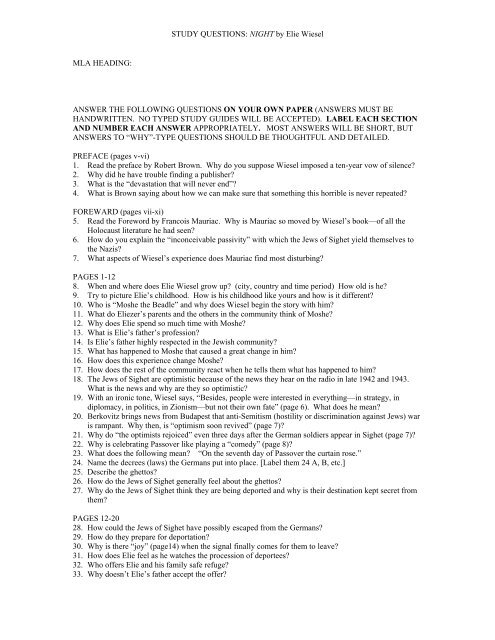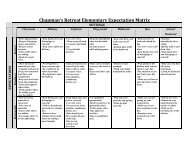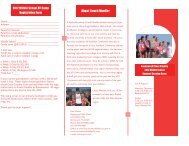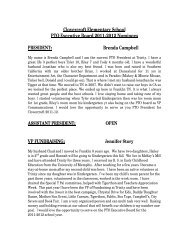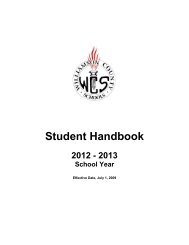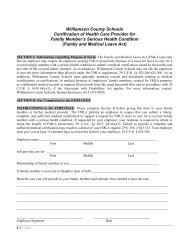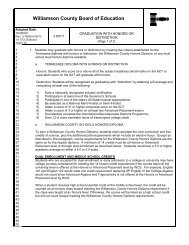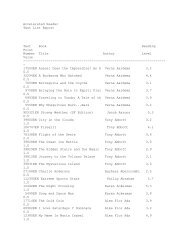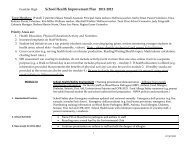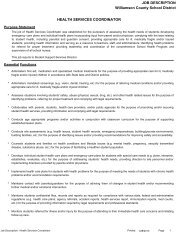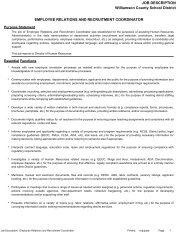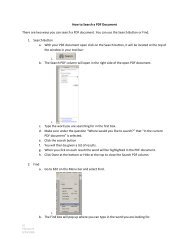STUDY QUESTIONS: NIGHT by Elie Wiesel
STUDY QUESTIONS: NIGHT by Elie Wiesel
STUDY QUESTIONS: NIGHT by Elie Wiesel
- No tags were found...
Create successful ePaper yourself
Turn your PDF publications into a flip-book with our unique Google optimized e-Paper software.
<strong>STUDY</strong> <strong>QUESTIONS</strong>: <strong>NIGHT</strong> <strong>by</strong> <strong>Elie</strong> <strong>Wiesel</strong>MLA HEADING:ANSWER THE FOLLOWING <strong>QUESTIONS</strong> ON YOUR OWN PAPER (ANSWERS MUST BEHANDWRITTEN. NO TYPED <strong>STUDY</strong> GUIDES WILL BE ACCEPTED). LABEL EACH SECTIONAND NUMBER EACH ANSWER APPROPRIATELY. MOST ANSWERS WILL BE SHORT, BUTANSWERS TO “WHY”-TYPE <strong>QUESTIONS</strong> SHOULD BE THOUGHTFUL AND DETAILED.PREFACE (pages v-vi)1. Read the preface <strong>by</strong> Robert Brown. Why do you suppose <strong>Wiesel</strong> imposed a ten-year vow of silence?2. Why did he have trouble finding a publisher?3. What is the “devastation that will never end”?4. What is Brown saying about how we can make sure that something this horrible is never repeated?FOREWARD (pages vii-xi)5. Read the Foreword <strong>by</strong> Francois Mauriac. Why is Mauriac so moved <strong>by</strong> <strong>Wiesel</strong>’s book—of all theHolocaust literature he had seen?6. How do you explain the “inconceivable passivity” with which the Jews of Sighet yield themselves tothe Nazis?7. What aspects of <strong>Wiesel</strong>’s experience does Mauriac find most disturbing?PAGES 1-128. When and where does <strong>Elie</strong> <strong>Wiesel</strong> grow up? (city, country and time period) How old is he?9. Try to picture <strong>Elie</strong>’s childhood. How is his childhood like yours and how is it different?10. Who is “Moshe the Beadle” and why does <strong>Wiesel</strong> begin the story with him?11. What do <strong>Elie</strong>zer’s parents and the others in the community think of Moshe?12. Why does <strong>Elie</strong> spend so much time with Moshe?13. What is <strong>Elie</strong>’s father’s profession?14. Is <strong>Elie</strong>’s father highly respected in the Jewish community?15. What has happened to Moshe that caused a great change in him?16. How does this experience change Moshe?17. How does the rest of the community react when he tells them what has happened to him?18. The Jews of Sighet are optimistic because of the news they hear on the radio in late 1942 and 1943.What is the news and why are they so optimistic?19. With an ironic tone, <strong>Wiesel</strong> says, “Besides, people were interested in everything—in strategy, indiplomacy, in politics, in Zionism—but not their own fate” (page 6). What does he mean?20. Berkovitz brings news from Budapest that anti-Semitism (hostility or discrimination against Jews) waris rampant. Why then, is “optimism soon revived” (page 7)?21. Why do “the optimists rejoiced” even three days after the German soldiers appear in Sighet (page 7)?22. Why is celebrating Passover like playing a “comedy” (page 8)?23. What does the following mean? “On the seventh day of Passover the curtain rose.”24. Name the decrees (laws) the Germans put into place. [Label them 24 A, B, etc.]25. Describe the ghettos?26. How do the Jews of Sighet generally feel about the ghettos?27. Why do the Jews of Sighet think they are being deported and why is their destination kept secret fromthem?PAGES 12-2028. How could the Jews of Sighet have possibly escaped from the Germans?29. How do they prepare for deportation?30. Why is there “joy” (page14) when the signal finally comes for them to leave?31. How does <strong>Elie</strong> feel as he watches the procession of deportees?32. Who offers <strong>Elie</strong> and his family safe refuge?33. Why doesn’t <strong>Elie</strong>’s father accept the offer?
<strong>STUDY</strong> <strong>QUESTIONS</strong>: <strong>NIGHT</strong> <strong>by</strong> <strong>Elie</strong> <strong>Wiesel</strong>34. On what day of the week is the family expelled and why is this ironic?35. They spend 24 hours in a synagogue. What are the conditions like? Give examples.36. How are the Jews moved out of Sighet?37. Why do you suppose no one tries to escape?PAGES 21-4338. Why does the Hungarian lieutenant move among the prisoners with a basket?39. What actions do “those who no longer wished to taste the bitterness of terror” take (page 22)?40. Who is Madame Schachter and why is she so upset?41. How do the others treat her and why?42. What is the first thing the prisoners see when they got to Birkenau?43. What do they smell?44. Who are the SS men?45. How do <strong>Elie</strong> and his father get separated from Mother and Tzipora?46. What is <strong>Elie</strong>’s last memory of them?47. Why do some of the younger men want to attempt an escape?48. Why don’t they go through with it?49. What lies do <strong>Elie</strong> and his father tell to Dr. Mengele and why?50. Why does <strong>Elie</strong>’s father wish <strong>Elie</strong> had gone with his mother and why is this ironic?51. What do you suppose <strong>Elie</strong> would say to those who claim that innocent children were not murderedduring the Holocaust?52. What is the Kaddish and why doesn’t <strong>Elie</strong> join his father in reciting it?53. How do the prisoners who are already in the barracks treat the newcomers?54. What are <strong>Elie</strong> and the others ordered to do?55. How does <strong>Elie</strong> change <strong>by</strong> the end of the first night? (physically, emotionally, and spiritually?)56. How does <strong>Elie</strong> keep his shoes from the “Kapos” at first?57. According to the SS officer, what is the only way to avoid the furnaces?58. Why does the gypsy strike <strong>Elie</strong>’s father and how does <strong>Elie</strong> react?59. To what new camp are the prisoners taken?60. Who is in charge of the block and what is his advice?61. How does <strong>Elie</strong> become “A-7713”?62. Describe “roll call.”63. Who is Stein and why does <strong>Elie</strong> lie to him?64. Why does Stein stop coming to see <strong>Elie</strong>?65. Akiba Drumer believes that God is testing the Jews and that this punishment they are enduring isactually a sign of love. What does <strong>Elie</strong> think of this theory?PAGES 45-6266. How could <strong>Elie</strong> have bribed the assistant to arrange for him to go with his father to a “good unit”?67. Why doesn’t he try the bribe?68. Where is music played in the camp?69. Why can’t the musicians play Beethoven?70. Why is <strong>Elie</strong> sent to the dentist?71. Why is he so desperate to keep his tooth and why doesn’t he succeed in keeping it?72. Who beats <strong>Elie</strong> in front of the French girl and why?73. Why is she afraid to speak to him?74. What advice does she give to <strong>Elie</strong> and what does this show about her?75. Why does Idek beat <strong>Elie</strong>’s father?76. Why is <strong>Elie</strong> angry at his father for getting beaten?77. Why does <strong>Elie</strong> give his father “marching lessons”?78. Why does <strong>Elie</strong> laugh at Idek and what is the result?79. What do the air raid sirens signify?80. Why is this a particularly dangerous time for prisoners?81. How is “terror stronger than hunger” (page 56)?82. How does the death of that one man affect <strong>Elie</strong> and how does he react when the air raid is over?83. Who are some of the people who die on the gallows?
<strong>STUDY</strong> <strong>QUESTIONS</strong>: <strong>NIGHT</strong> <strong>by</strong> <strong>Elie</strong> <strong>Wiesel</strong>84. What phrase do many repeat before their deaths?85. Why are people hanged rather than being shot or killed some other way?86. Whose death affects <strong>Elie</strong> the most and why?87. Why does <strong>Elie</strong> find the soup “excellent” (page 60) after one execution, but tasting of “corpses” afteranother (page 62)?PAGES 63-8088. What is Rosh Hashanah?89. Why do you suppose even “Kapos, functionaries of death” (page 63) come to the Rosh Hashanahservice?90. What is going through <strong>Elie</strong>’s mind?91. Is <strong>Elie</strong> in the minority when he “rebelled” inwardly and why does he call the place where the Jewsmeet to pray a “mirage” (page 65)?92. What does <strong>Elie</strong> mean when he says of his father, “We had never understood each other so clearly”(page 65)?93. What is Yom Kippur?94. Why doesn’t <strong>Elie</strong> fast?95. What is the “fine New Year’s gift” the SS gives the prisoners (page 66)?96. What advice does <strong>Elie</strong> get from the head of the block about avoiding selection?97. What does <strong>Wiesel</strong> mean when he says, as the prisoners stand naked, “This must show how one standsat the last judgment” (page 68)?98. What is Dr. Mengele’s attitude during the “selection”?99. What are <strong>Elie</strong>’s thoughts as he goes through the “race”?100. What sorts of “presents” and “inheritance” gifts does <strong>Wiesel</strong>’s father give <strong>Elie</strong> and why?101. Why does <strong>Elie</strong> return them to his father?102. What does this show about how life changes when mere survival is a struggle?103. What happens to many of the prisoners when they lose faith?104. Why does <strong>Wiesel</strong> tell the story of Akiba Drumer—and how everyone forgets to say the Kaddish forhim?105. How does <strong>Wiesel</strong> end up in the hospital?106. What decision is <strong>Wiesel</strong> faced with while he is in the hospital?107. What is <strong>Elie</strong>’s choice and why does he choose this option?108. Why is the camp being evacuated?109. Why do the prisoners want the Russians to arrive first?110. What is meant <strong>by</strong> the question the prisoners ask: “were they [SS] going to let the Jews hear the twelfthstroke sound?”111. How does the “face of the camp” change on the morning of the evacuation (page 79)?112. Why does the head of the block order the prisoners to clean the floor, and how do you think theprisoners feel about this task?113. Reread the description of the evacuation at the end of the chapter. Why does the author choose to usea series of short sentences in this passage? What is the effect?PAGES 81-92114. What does <strong>Wiesel</strong> mean <strong>by</strong> the observations of the SS men “Their fingers on the triggers, they did notdeprive themselves of this pleasure” (page 81)?115. What is sadism and where do you seen evidence of it in the novel?116. What happens to Zalman?117. In what way are <strong>Wiesel</strong> and the other Jews who keep rushing onward “masters of nature” (page 83)—then in the morning “without strength, without illusions”?118. How do <strong>Wiesel</strong> and his father help each other stay alive?119. Why does <strong>Wiesel</strong> tell the story of Rabbi Eliahou?120. Why is he glad that the rabbi “should continue to look for his beloved son” (page 87)?121. Why do you think that “sons abandoned their fathers’ remains without a tear” (page 87)?122. How does <strong>Wiesel</strong> avoid suffocation?123. Why does <strong>Wiesel</strong> think he is hallucinating?124. Why is Juliek playing his violin in this terrible situation?
<strong>STUDY</strong> <strong>QUESTIONS</strong>: <strong>NIGHT</strong> <strong>by</strong> <strong>Elie</strong> <strong>Wiesel</strong>125. What happens to Juliek?126. How does <strong>Wiesel</strong>’s father avoid being “selected“ at Gleiwitz and why does <strong>Wiesel</strong> run after him to theleft?PAGES 93-109127. How does <strong>Wiesel</strong> convey a sense of hopelessness in this final section of the book?128. Why do the two men try to throw <strong>Wiesel</strong>’s father from the carriage?129. Why do the living “rejoice” when the order comes to throw out the corpses?130. What is the author trying to say about the prisoners at this point?131. How do the prisoners in the wagon (page 95) act like animals?132. Why do the German workmen take a “lively interest in this spectacle” when they have merely stoppedand stared at marching prisoners before?133. Why doesn’t <strong>Wiesel</strong> join in this scramble for food (page 96)?134. How are Meir and his son similar to other fathers and sons <strong>Wiesel</strong> describes?135. What is the author saying about how the concentration camps affect the bonds between loved ones?136. How does Meir Katz save <strong>Elie</strong> <strong>Wiesel</strong>’s life?137. What advice does <strong>Wiesel</strong>’s father give Katz in an attempt to save him?138. How does he know the advice doesn’t yield success?139. Why is it that <strong>Wiesel</strong> “could have wept with rage” when his father begs for rest upon arrival atBuchenwald (page 100)?140. Why does <strong>Elie</strong> feel that he is arguing “with death itself”?141. Why does <strong>Wiesel</strong> leave his father when the sirens wail, and how does he feel about this later?142. Is his father angry at <strong>Elie</strong> for deserting him?143. What emotions does <strong>Wiesel</strong> experience that last week as he watches his father die?144. Why does <strong>Wiesel</strong> decide to be an “invalid” (page 105)?145. Why doesn’t he see his father die and why doesn’t he cry?146. What are <strong>Wiesel</strong>’s thoughts during the months after his father’s death?147. What would have happened if the children had gone to the assembly place, as ordered?148. Why do the SS men flee the camp?149. When is <strong>Wiesel</strong> finally freed?150. Why is <strong>Wiesel</strong> sent to a hospital after his liberation?151. The book ends with a haunting sense of hollowness. Why do you think the author ends with this tone?REFLECTION <strong>QUESTIONS</strong>152. Why do you think <strong>Elie</strong> <strong>Wiesel</strong> wrote this book?153. Why do you think he chose Night as its title?154. How does <strong>Elie</strong> change as a result of his experiences in the concentration camps?155. How does <strong>Elie</strong> finally come to terms with his ordeal? (What does he finally do?)156. Give examples of issues in Night that still arise today and what do you think should be done aboutgenocide?CHARACTERS: 1. <strong>Elie</strong> 2. <strong>Elie</strong>’s father 3. Franek 4. Gestapo5. Idek 6. Juliek 7. Kapos 8. Madame Schachter 9. Moshe the Beadle10. Meir Katz 11. Dr. Mengele 12. “the pipel” 13. Rabbi Elahou (& sons)14. SS Officers 15. Stein 16. the dentist 17. the French girl 18. the gypsy19. Zalman 20. Tzipora 21. Tibi and YossiPLACES, RELIGIOUS CUSTOMS, AND OTHER WORDS TO KNOW:22. Auschwitz 23. Expulsion 24. Pentecost 25. Warsaw26. Birkenau 27. Ghettos 28. Rosh Hashanah 29. Yom Kippur30. Buchenwald 31. Sighet 32. Buna 33. Hasid (Hasidism)34. Synagogue 35. Cabbala 36. Daschau 37. Talmud38. Deportation 39. Passover 40. TorahSTAPLE THIS HANDOUT TO THE BACK OF YOUR ANSWERS. POINTS WILL BE DEDUCTEDFOR NOT FOLLOWING DIRECTIONS
<strong>STUDY</strong> <strong>QUESTIONS</strong>: <strong>NIGHT</strong> <strong>by</strong> <strong>Elie</strong> <strong>Wiesel</strong>


